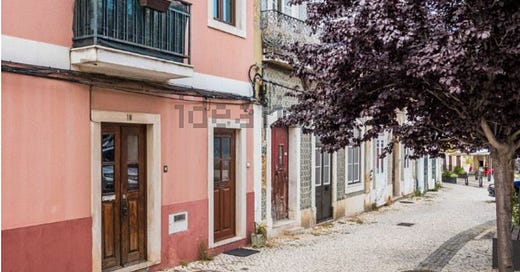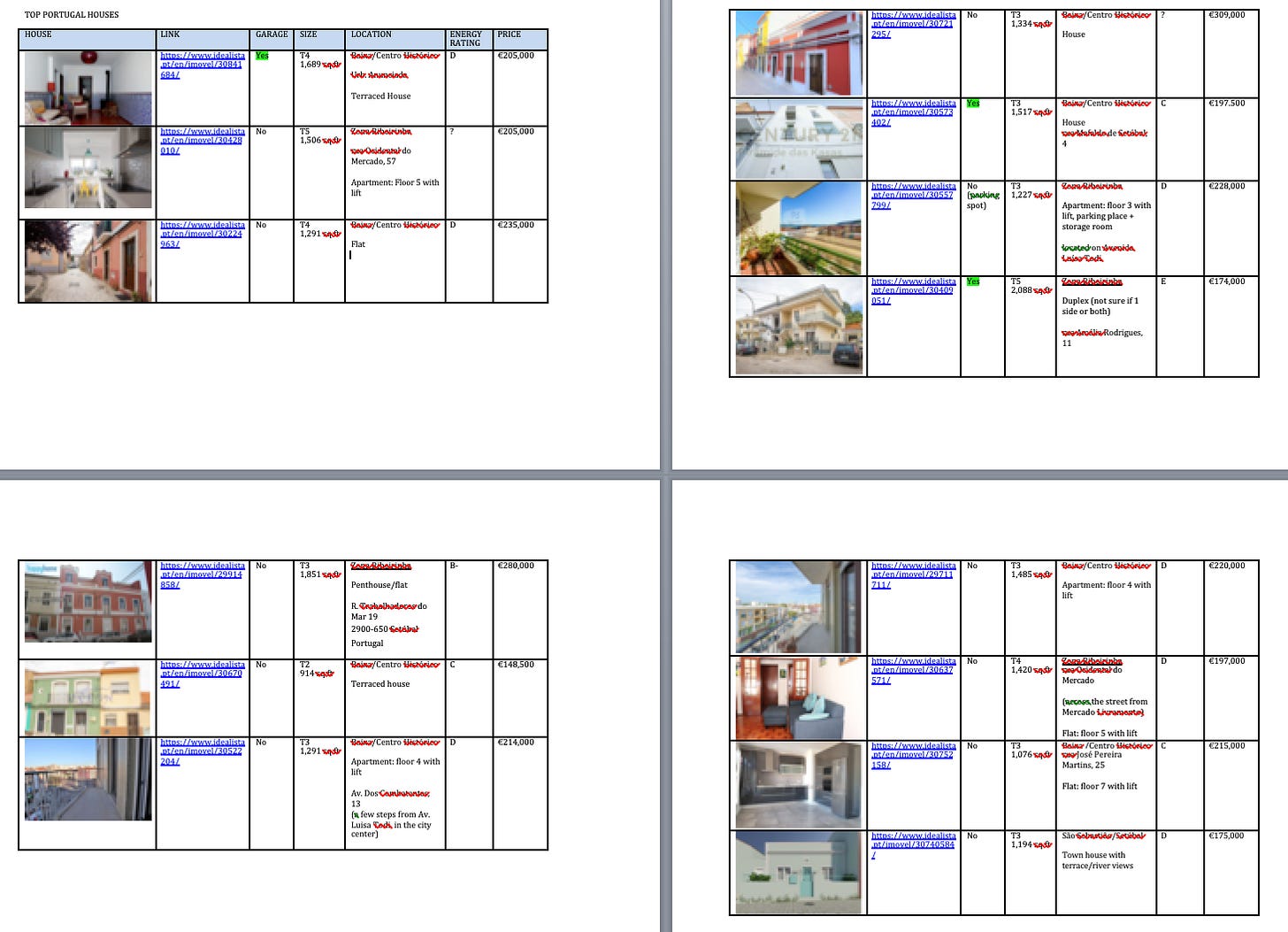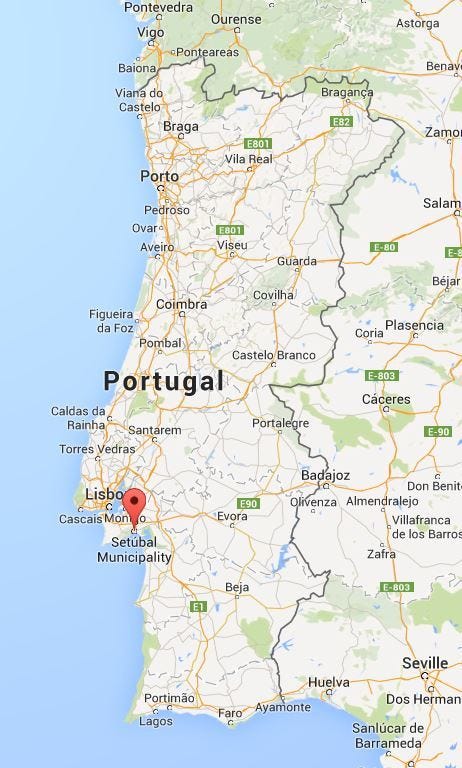This house, situated on a picturesque cobbled street in Setúbal, Portugal, is exactly 5,691 miles (9,158 km) from where I currently sit. I have never seen this house in real life. I’ve never set foot inside the door.
But it’s mine. And in a few months, it will be my family’s new home.
You’re reading that right. I (we, actually—because Marido shares responsibility for this insanity) have purchased a home we’ve never seen, in a country we’ve never been to. Very soon we will sell a large portion of our earthly belongings, put the rest in a few suitcases and a shipping container, and make our way across the Atlantic to Portugal. Where we’ll be living. Like, permanently.
Had you told me a year ago this would be my reality, I might have thought it sounded really cool. But I also would have thought it sounded crazy.
The two can exist simultaneously, though. Crazycool is a thing.
Some friends have said I’m—we—are “brave” to do this. That word, I’m not sure about. The decision to leave the U.S. and plant roots in another country feels more… inevitable. Like we’ve been heading this way for a very long time, and finally, thanks to the life-changing re-prioritizing properties of pandemic life, here we are.
I’ve been called a selfish coward, too. As word spreads that we’re opting out of America, I’ve heard a couple of strong reactions. The coward accusation rode on the back of, “You’re just running away.” Running away from the U.S., from San Francisco, from my mother’s dementia, I guess.
Sometimes at 3 a.m. when I blink awake and my brain starts spinning, the “crazy” part of the equation looms larger than the “cool.” In the dark, I fear the naysayer could be right. That I might, in some corner of my brain, be throwing up my hands in frustration and saying, “Fuck this shit! I’m out.” Taking my toys and leaving.
But the truth is, this idea, this life-changing plan, was not born in fear.
It was born in hope, and in the belief that we don’t have to do all the stuff we all do just to have a good life. The belief that we don’t have to run the rat race, play the game, bring home the best and thickest cuts of bacon. The belief that we can unsubscribe from the version of life that depletes us.
We can build something different. Something better.
That is why we’re moving to Portugal. Not to run away from responsibility, but to run toward possibility. For Marido and I, yes, but especially for Filha. We can give her a bigger life. One with a new language and a new history and a new way of looking at the world. We can show her that it doesn’t matter how old you are—you can take big, bold steps. You can reimagine your life.
I know there is a whole other post waiting to be written about why we chose Portugal, specifically. Also, what are we going to do for money once we get there? Where’s Filha going to go to school? And do we recognize the innate privilege we have in even being able to make this move? But those are topics for another time.
Right now, we’re delving into the crazycool house purchase.
That screenshot above is just one version of our house hunt list, back in November.
The timeline went like this: The Portugal idea came to us in July, we researched like crazy for three months, decided to do it for real in October, started looking at real estate in November, made an offer on a house in December, and closed the deal in February.
Originally, we planned on renting for at least a year, getting to know the lay of the land before we did something truly serious like buying. So Marido began a hardcore search of rental properties in and around Lisbon.
The more he searched, the more he began to dislike the idea of renting. So he came to me one day and said, “What if we just buy a place? It doesn’t have to be a forever home, it can just be a place where we get started. Then, if and when we move on, we’ll keep it and rent it out. Friends can stay there when they come to visit. It will be an investment.”
Marido is the brains of the financial operation around here, so my part at that point was just kind of shrugging and being like, “Sure. Makes sense.”
The house hunt switched from rental to sale properties, and Lisbon began to look less appealing. It’s the most expensive city in Portugal, and having lived in San Francisco for two decades, we’re both completely over living in “the most expensive” anything.
That’s part of the whole point of moving overseas. To un-check the “pricey real estate” box.
So we widened the circle on the map. We began looking outside of Lisbon—still close enough to the city that we could visit easily, but far enough away that the asking prices dropped. We looked at Sintra, Cascais, Cabo da Roca, Oeiras, Carcavelos.
And then we (actually, it was me—I can take credit for this one) found a town just south of Lisbon called Setúbal.
Setúbal is a city of about 90,000 people. It sits on the banks of the Sado River, which flows out into the Atlantic Ocean. To the west of Setúbal lies the Parque Natural da Arrábida—a mountainous national park. To the east is the Reserva Natural do Estuário do Sado, a wetland nature reserve that is occasionally home to nesting flamingos. There are gorgeous beaches scattered all around, and a pod of bottlenose dolphins make their home in the water off Setúbal all year long.
The city itself has been there for centuries, although it wasn’t recognized as such until September 15, 1860 when King Pedro V gave it the official nod. In the 1400s, Setúbal served as a royal residence during the reign of King John II. The Monastery of Jesus was built (begun) in 1490, and the Castelo de São Filipe was built in the 16th century.
The monastery and the castle are still standing (and see thousands of tourists each year), many of the oldest building in Setúbal were destroyed in the catastrophic Lisbon earthquake of 1755. Just opposite the city, in the sand hills of Tróia peninsula, are the ruins of the Roman town of Cetobriga, which was decimated by a tidal wave in 412 CE.
Our house (it still gives me chills to say that) is near the Centro Histórico, the oldest part of the city. Streets in that area are narrow, cobbled, and winding, and often open up into squares and plazas lined with cafes, sculptures, and fountains. Setúbal’s largest square, Praça do Bocage, is named after a local poet, Mr. Manuel Maria Barbosa l’Hedois du Bocage (1765-1805).
The city is a friend to artists of all kinds, naming its main thoroughfare after mezzo-soprano opera singer Luísa Todi (1753-1833). Modern Setúbal features many galleries, sculptures, and a thriving graffiti and street art scene.
But sitting as it does on the river banks, Setúbal has always been—and still is—a fishing town. It was once the main hub for sardine canneries and today boasts the largest covered market in Europe, selling fish, meat, bread, and fruit. The Mercado do Livramento is just a few blocks from our new home, and is sure to be one of our regular haunts.
Have I sold you on Setúbal yet? It seems a lovely place to start our ex-patriation adventure. (I can let you know for sure about that later this year.)
Once we set our sights on Setúbal as a destination, it wasn’t long before we found a list of likely homes (we went down the real estate rabbit hole on idealista) and a truly lovely real estate agent named Elda.
With Elda’s help, we made a list and then narrowed it down. We exchanged a thousand WhatsApp texts. She visited our favorite candidates and sent us videos from her phone.
For a week or two, we thought we had fallen in love with a small white house with forest green shutters in the Palhava neighborhood (we called it “The Blue Tile House” because of the traditional azulejos lining the entry hall). But it turned out the owner didn’t want to sell, after all. We let it go.
Soon our focus narrowed to the house pictured at the top of this post, dubbed “The Orange House.” Elda visited, more than once. We scrutinized the photos and videos she sent. (I reviewed them over and over and over. It was actually unhealthy.) Just before Christmas, we decided: this is the one.
We made our offer. Haggling ensued.
Then, just after New Year’s Day, we signed the Contrato Promessa de Compra e Venda: the Purchase and Selling Promise Contract. One week ago, we signed the deed. By “we,” I mean a Portuguese lawyer named Jose, whom we deputized to sign in our stead since, you know, COVID.
If that process sounds easy and uncomplicated, it wasn’t. Nothing goes smoothly in pandemic reality, especially not a transatlantic transaction in which the sellers cannot show up in person.
There were issues. It was complex. It involved NIF numbers and wire transfers and multiple attempts to open a bank account in a foreign country when you’re not there yet.
There were trips, so many trips, to the Portuguese Consulate in San Francisco to get documents notarized. There was even a stop at the Wyoming Secretary of State’s office in Cheyenne to get an apostille. (We were driving home from that Midwest Winter Adventure of the previous post, and we panicked.) The Cheyenne people were very nice about it.
Overall, would I recommend purchasing a property you’ve never seen in a country you’ve never visited? No. No I would not. But extreme times call for extreme measures. Also known as: pandemic life makes you crazycool.
And in this case, it all worked out. Stay tuned to see what happens next!
Copyright © 2021 LaDonna Witmer







LaDonna...I just read this and literally burst into tears! My husband and I have been talking and preparing for the idea of relocating and retiring to Portugal and, I swear, your articles have really made the idea real for me....for us. I was laid off from my job on June 4th and, frankly, I'm terrified. I believe I'm holding it together fairly well, for the most part....of course, my tearful outburst and trying to type this response thru a sea of tears is somewhat evidence to the contrary....but I'm trying to be strong, particularly for my life partner. I haven't been unemployed in over 20 years, but I've had the nagging question lingering in my brain for some time now, "Is it all worth it???" We have worked so hard to build a beautiful and comfortable home here in southern Maine and we have a blessed life and wonderful family nearby....but we are both 54 and longing for something different. And frankly, I think you and I are on the same page when it comes to whether this country is still worth living in. I'm black and my husband is white....and as a black man, these past few years have not been easy. And not to make it all about that, but boy, does the climate here play a HUGE part in my wanting to find peace and tranquility and a better quality of life in Portugal. We also have done the initial work of tons of YouTube videos, and culling real estate listings....we are part of a few wonderful Facebook expat groups and are making new friends and meeting people online who can assist with our move. I even have a very close friend who is native to Portugal and is helping guide our thoughts on this. My only regret, at this point, is that I'm not as bold as you and Marido. My fear is not being financially prepared to make the move. I'm already scared out of my mind on what we're going to do if I can't find a job here at home, going from 2 incomes to a single income, where my husband makes considerably less than I do. And I'm desperately trying to overcome that fear and begin actual planning of how to make this happen. I guess I just wanted to share how much your articles are helping me in doing that. Just typing all this out has subsided the tears and has given me a sense of peace. I've subscribed to your newsletters and am going to keep following your journey! I'm so incredibly excited for you and your family and I wish you all the best. And I've heard so many wonderful things about Setubal, I'm thinking it very well may end up the town for us as well. Thanks so much for sharing your story. My heart is with you guys.
"The belief that we can unsubscribe from the version of life that depletes us." LOVE THIS!!!! (can I use it? with credit of course.) I think is is CRAZYCOOL. I'm jealous ;) I want to go with you. Hopefully....you can show me around and I will take photos, of course!